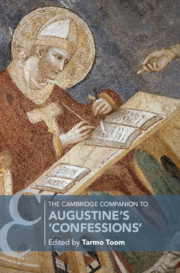Book contents
- The Cambridge Companion to Augustine’s Confessions
- Cambridge Companions to Religion
- The Cambridge Companion to Augustine’s Confessions
- Copyright page
- Contents
- Contributors
- Acknowledgments
- Abbreviations
- Introduction
- Part I Circumstances of Composition
- Part II Main Themes and Topics
- Part III Reception and Reading Strategies
- 15 Manuscript Transmission, Critical Editions, and English Translations
- 16 Reception in the Middle Ages
- 17 Reception in the Period of Reformations
- 18 Reception during the Enlightenment
- 19 Reading (in) Augustine’s Confessions
- A Bibliographical Note
- Index
- Other Titles in the Series (continued from page ii)
- References
19 - Reading (in) Augustine’s Confessions
from Part III - Reception and Reading Strategies
Published online by Cambridge University Press: 22 February 2020
- The Cambridge Companion to Augustine’s Confessions
- Cambridge Companions to Religion
- The Cambridge Companion to Augustine’s Confessions
- Copyright page
- Contents
- Contributors
- Acknowledgments
- Abbreviations
- Introduction
- Part I Circumstances of Composition
- Part II Main Themes and Topics
- Part III Reception and Reading Strategies
- 15 Manuscript Transmission, Critical Editions, and English Translations
- 16 Reception in the Middle Ages
- 17 Reception in the Period of Reformations
- 18 Reception during the Enlightenment
- 19 Reading (in) Augustine’s Confessions
- A Bibliographical Note
- Index
- Other Titles in the Series (continued from page ii)
- References
Summary
This chapter presents reading scenes in the “Confessions” as models for an individual’s reading as a social or intersubjective act, and places Augustine’s work in the cognitive ecology of the late Roman Empire.
Keywords
- Type
- Chapter
- Information
- The Cambridge Companion to Augustine's 'Confessions' , pp. 317 - 334Publisher: Cambridge University PressPrint publication year: 2020

